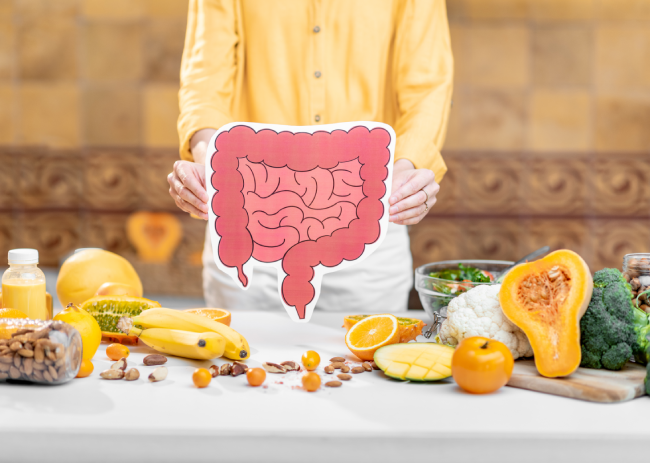Understanding the link between gut health and sleep can feel like navigating a complex maze.
You may be clueless about how to improve both. This post explains the connection between your gut health and better sleep, so you can be someone who gets a good night’s sleep rather than one who tosses and turns all night.
Signs and Symptoms of Poor Gut Health
There are typical symptoms you may be experiencing that can have an impact on your sleep. You first need to understand the signs of poor gut health before you can treat them and thereby improve your sleep.
This connection works both ways. Poor sleep can affect the gut as well as poor gut health affecting your sleep. A recent study has shown that poor sleep can disrupt the balance of your gut microbiota leading to changes in your gut microbiome. If you suffer from any of the following, it may have an impact on your sleep:
- Persistent Digestive Issues: Frequent bloating, constipation or diarrhoea could indicate an unhealthy gut.
- Sleep Disturbances: An imbalanced gut can affect your sleep-wake cycle causing disrupted sleep or insomnia.
- Inconsistent Energy Levels: If you constantly feel tired despite getting adequate rest, it might be due to impaired nutrient absorption caused by an unhealthy gut.
- Mood Fluctuations: Your mood is heavily influenced by your ‘second brain’ – the enteric nervous system (ENS). A disturbed ENS often results from bad bacterial growth leading to increased anxiety levels and depression.
More serious issues like sleep apnea (an interruption in breathing while sleeping), gastroesophageal reflux disease (GERD) or inflammatory bowel syndrome (IBS) could be the underlying cause of poor sleep according to Journal on Sleep. You should follow up with your doctor if you experience any of these symptoms.
Connection Between Gut Health and Sleep
The gut microbiome, a bustling metropolis of gut bacteria living in our digestive system, has an unexpected tenant: sleep quality. You may wonder what the link between gut health and sleep is. Let’s take a closer look at this relationship between your gut and brain and how it affects our ability to get a great night’s sleep.
The Gut-Brain Axis
This connection between gut bacteria and restful nights can be traced back to what scientists refer to as the gut-brain axis.
In simple terms? It’s all about communication. Our body operates like a finely tuned orchestra – every section needs to play its part for a harmonious performance.
- Gut microbes send messages through this network to the brain that impact various bodily functions such as circadian rhythms (the internal clock that regulates our wake-sleep cycle).
- Poor or disrupted sleep can throw off these messages, leading to shifts in your gut microbiome composition which might have a negative impact on your overall health.
Improve Your Gut Health for Better Sleep
We are all looking for ways to improve our sleep, and the connection between your gut health and sleep quality is more significant than you might think. The ecosystem in your gut is a complex collection of bacteria in your digestive tract and plays a key role not only in digestion but also in the quality of your sleep.
Let’s take a look at some strategies to get you on the road to a healthy gut and better sleep.
Maintain a Balanced Diet
To start with, what are we feeding ourselves? Eating a healthy and balanced diet is the first step. A diet rich in fiber encourages the growth of beneficial bacteria within our guts. Foods like fruits, vegetables and whole grains should be staples on your plate if you’re aiming for improved digestive health which ultimately helps with good sleep patterns by regulating circadian rhythms.
In addition to this staple fare, add fermented foods such as yoghurt or kimchi – they come packed with probiotics which boost healthy microbes within us leading towards an overall healthier gut microbiota.
Regular Exercise
Regular physical activity has been shown to positively influence the composition of one’s gut microbiome. It increases its diversity while reducing stress levels which is another key factor contributing towards poor sleep quality.
So get moving. Whether it’s hitting up yoga classes or simply taking brisk walks around neighbourhood parks, any form of exercise can help improve sleep along with maintaining optimal bacterial balance inside the belly.
Lifestyle Changes
Certain lifestyle habits could negatively impact both facets – your nightly shut-eye routine and gastrointestinal well-being simultaneously. For instance, late-night snacking disrupts natural body clock functions causing disturbances during sleeping hours. Overeating may result in gastroesophageal reflux disease (GERD), a common cause of disrupted slumber due to heartburn at night.
Also consider moderating alcohol intake since excessive consumption is linked to changes in microflora, having a negative impact on our bodies.
The Benefits of Good Gut Health
The interplay between gut health and sleep quality is a fascinating dance, each partner influencing the other in an ongoing rhythm. When your gut microbiome composition hits all the right notes, it leads to improved sleep efficiency. And just like that perfect melody can inspire you to move on the dance floor, good sleep also helps maintain a healthy gut.
Strengthened Immune System
A well-balanced gut has been linked with bolstering our immune system due to beneficial bacteria acting as bouncers against harmful pathogens trying to crash our body’s party. Adequate shut-eye acts as backup support for these microbial guards.
Sleep deprivation or disrupted rhythms can lower this immune response, turning those once vigilant bouncers into tired gatekeepers allowing more unwanted guests through doors. Ensuring optimal digestive health along with good sleep will keep defences strong, ready to face any intruders head-on.
Better Digestive Functionality
Gut disturbances such as gastroesophageal reflux disease (GERD) often cause disturbed nights because they throw off natural circadian rhythms in our bodies. By nurturing the microbiota by maintaining a healthy diet, incorporating fermented foods rich in probiotics, and taking necessary supplements, we can create an environment that leads to better digestion and fewer sleep interruptions.
Elevated Mood & Energy Levels
Have you ever noticed that when you don’t eat healthy, your mood and energy levels are off? You’re not alone. Our mood and energy levels are greatly influenced by both the quality of rest and what scientists call the “gut-brain axis”. This connection means that when you ignore your healthy diet, this leads to an unhealthy gastrointestinal tract and could lead to feeling tired throughout the day, despite having slept the night before.
A study published in the Journal of Sleep found that individuals who reported poor sleep had altered microflora compared to high-quality sleepers. Rebalancing through healthier lifestyle choices and dietary improvements may not only improve your sleep but also your mental state.
Gut Issues At Bedtime
What about when your digestive issues happen while you’re trying to sleep? There may be some specific changes you could make before bedtime:
- Avoid late-night eating: Going to bed on a full stomach increases the risk of heartburn and indigestion; try finishing meals at least three hours before sleeping.
- Elevate head during sleeping: If acid reflux keeps waking you up then consider raising the head end of the bed slightly; this uses gravity to help keep stomach acids where they belong – down in the stomach!
- Lifestyle modifications: Limiting caffeine intake, especially near bedtime might help reduce symptoms of GERD. Quitting smoking improves overall gastrointestinal health thereby improving the likelihood of getting a good night’s rest too!
FAQs in Relation to Gut Health and Sleep
Can poor gut health cause sleep problems?
Absolutely. Poor gut health can disrupt your circadian rhythm, leading to sleep interruptions like insomnia or irregular sleeping patterns.
How can I improve my gut health and sleep?
Eating a balanced diet rich in fiber, staying hydrated, exercising regularly, and maintaining a consistent sleep schedule are all key to improving both gut health and quality of sleep.
Does sleep affect the gut microbiome?
Yes. Research indicates that a lack of adequate restful sleep can negatively impact the diversity and balance of beneficial bacteria in your gut.
Does research show the importance of sleep for those with gut health conditions?
Certainly. Studies suggest that individuals with gastrointestinal disorders often experience improved symptoms after optimizing their sleeping habits.
Michael O’Neil is a certified sleep coach and entrepreneur who is passionate about solving your sleep issues by sharing great tips and sleep products at michaelroneil.com.

